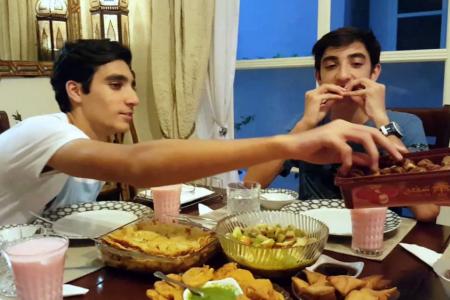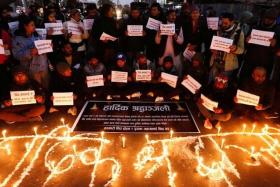Breaking fast with the Faruqis
Ramadan is considered to be the holiest month in the Islamic calendar.
For the whole month, Muslims focus on prayer, fasting, giving to charity, and religious devotion.
From dawn to dusk, sunrise (subuh) to sunset (maghrib), Muslims abstain from all food and drinks.
In Singapore, the fast lasts for approximately 14 and a half hours.
But while those born here are used to fasting in this hot and humid environment, have you ever wondered how those who just moved here are coping?
In Singapore, we're used to our local Malay and Indian cuisines, and of course, food from Geylang Bazaar.
But do you know what kinds of food non-local Muslims eat?
Do you wonder if they have a different way of breaking their fast?
The New Paper spoke to a Pakistani family who is spending their first Ramadan here.
Mrs Sabeen Faruqi, 41, and her husband Mr Habeeb Faruqi, 50, have three children - Sarah, 12, Khizr, 14, and Omar, 16.
They lived in Dubai for more than eight years before moving to Singapore nine months ago when Mr Faruqi, a banker, was offered a job here.
A DIFFERENT FOOD CULTURE
When TNP visited their home on Monday, it was already 6:30pm, and we joined Mrs Faruqi, a housewife, and her children as they prepared the food for iftar (breaking of fast).
They were preparing an entire feast of Pakistani dishes.
Sarah was making fruit chaat (fruit salad with chaat masala added into it), Khizr was mixing the Rooh Afza syrup with milk (similar to Singapore's bandung), and Omar was helping their mother fry their samosas (unlike Indian samosas, Pakistani ones are smaller, and made with minced beef).
Meanwhile, Mrs Faruqi was busy making the pakora (potato and gram flour dumplings) and malai boti (chicken marinated in yoghurt, cream and spices).
Mrs Faruqi told TNP: "We Pakistanis never have iftar without some pakora and samosa."
They also prepared paratha (which is served with malai boti as a paratha roll), chickpea salad and the only dish that wasn't Pakistani, lasagne (for Sarah, Mrs Faruqi said)
By 7pm, the dining table was ready.
By 7.10pm, everyone was seated at the table, including Mr Faruqi, who had been doing some work in the basement.
At 7.14pm, the family broke their fast with the dates Mr Faruqi was handing out around the table.
They carried out their maghrib (sunset) prayers before returning to the table to have their iftar.
This is a tradition that was started by Prophet Muhammad, who would break his fast with a date and perform his prayers before continuing with his iftar.
ADAPTING TO CHANGE
Mrs Faruqi said: "I like (fasting here) because the fast is shorter. In Dubai, it was about an hour and a half more, so it wasn't too much of a challenge (to adjust to fasting in Singapore)."
But she did admit that while it was hotter in Dubai, Singapore is certainly more humid.
They drove everywhere when they were in Dubai, too, so they were never in the sun. Even the bus stations were air-conditioned.
It took a while for the children to adapt to their new surroundings, but Mrs Faruqi said the convenience of public transport here definitely helped.
Their home is located a five-minute walk away from an MRT station, so they take the MRT to school.
The children are all students at the Lakeside campus of the Canadian International School, located in Jurong West.
While the children were initially struggling with fasting here, Mrs Faruqi said they have been less tired recently, since their school year ended last week and they are on their summer break.
"They like it here, because of how easy it is to commute. They like the independence. In Dubai, I had to drive them around wherever they wanted to go. Here, they can just take the MRT, since it's so near," Mrs Faruqi said.
But one thing the entire family had to sacrifice they moved was the comfort of having people they knew around them.
"We had friends and family back in Dubai, but we didn't know anyone in Singapore when we first moved."
To combat that, the family joined the Singapore Pakistani Association (SPA), which provides a platform for Pakistanis in Singapore to "socialise and connect with one another", according to SPA President Sophie Shaikh.
Through SPA, Mrs Faruqi gets to hone her passion for philanthropy.
She has volunteered at the Pertapis Children's Home through the organisation.
The volunteers teach the Pertapis children English and Mathematics. More recently, the children were given clothes for Hari Raya.
Mrs Faruqi and her children also help out the SPA hospice care team in their free time.
The care team pays monthly visits to a hospice located at Woodlands, where they carry out activities, such as painting, with the hospice patients.
The events organised by the SPA gives them the opportunity to meet other Pakistani families in Singapore, and helps them become more comfortable staying here.
She said: "So far, it's been very good. It's been easy to adapt, and we're starting to settle down."
Get The New Paper on your phone with the free TNP app. Download from the Apple App Store or Google Play Store now


